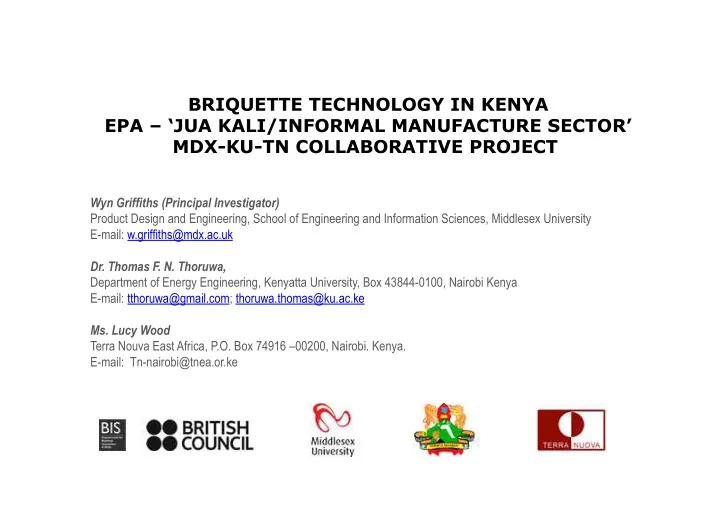

BRIQUETTE TECHNOLOGY IN KENYA EPA – ‘JUA KALI/INFORMAL MANUFACTURE SECTOR’ MDX-KU-TN COLLABORATIVE PROJECT Wyn Griffiths (Principal Investigator) Product Design and Engineering, School of Engineering and Information Sciences, Middlesex University E-mail: w.griffiths@mdx.ac.uk Dr. Thomas F. N. Thoruwa, Department of Energy Engineering, Kenyatta University, Box 43844-0100, Nairobi Kenya E-mail: tthoruwa@gmail.com; thoruwa.thomas@ku.ac.ke Ms. Lucy Wood Terra Nouva East Africa, P.O. Box 74916 –00200, Nairobi. Kenya. E-mail: Tn-nairobi@tnea.or.ke
Project overview Collaborative project addressing deforestation and domestic energy use, using appropriate technology, in Kenya
Project objectives Specific objectives of the project are to: Manufacture biomass fuel briquettes • within the informal sector in Nairobi using appropriate technologies Develop design and engineering skills • and artisan partnerships for KU and MDX students in areas of HCD, Design for Social Change, appropriate technology, sustainability and entrepreneurship Develop an improved biomass stove for • use with developed biomass briquettes
Focus areas of the project • Optimisation of fuel briquette production in terms of efficient manual machinery for production and use of fuel briquettes • Development of Rapid Design and Manufacture approaches • Development of a web-based information hub CAD and Briquette composition work by: Sam Dempsey PDE MSc Design, Engineering and Manufacturing Management students
Initial blog: Testing content ideas and approaches Developing web-hub: ‘Madegood.org’ Designed and branded to allow publication, sharing, creative generation and sustainability of ‘Jua Kali’ and further projects
Project strategies Develop effective, and sustainable, • communication, sharing and publication medium for ‘Jua Kali’ collaboration. With future capability to support ecommerce for design project output. • Enhance industry engagement and collaboration in design and manufacture? • Enhance market penetration of fuel briquettes and accompanying entrepreneurial activity from production Opportunity for creative, of such, in the ‘Jua Kali’ sector? ‘unusual’ approach to briquette promotion and Develop links between MDX, KU and TN - • perception changing encourage and support ongoing academic cooperation. • Introduce and develop 3D CAD modelling and analysis capability in KU
Project strategies (cont..) • Develop links between MDX, KU and TN for specific project work (e.g. briquette manufacture) exchange and curriculum development. Increase level of skill base in students • with regards to design and manufacturing skills requirement. Develop industry standard CAD • modelling, engineering drawing and specification capability.
Expected benefits of Indicators of project briquette technology success: • Briquetting production machinery improved; • Domestic stoves produced; • Jua kali production costs reduced; • Jua kali briquette production volumes increased; • Jua kali income increased. • NEW – META-INDICATOR Briquette penetration and perception changed – supporting and driving all of the above
Briquette technology project challenges: • Time consuming Institutional long bureaucratic procedures; • Lack of biomass energy consumption data; Lack of networking in biomass energy sector in Kenya; • Inadequate skills and training in the Jua kali sector; • Inefficient use and /lack of manufacturing tools and equipment by the Jua Kali artisans; • • Inefficient utility cooking stoves/jikos • Negative attitude to academia and researchers to the Jua Kali sector; Negative attitude by consumers towards Jua Kali products; • Lack of biomass stove testing standards in Kenya •
Addressing briquette Briquette technology challenges technology challenges • Imported briquette machines very • Reduce lengthy institutional expensive and high maintenance bureaucratic procedures; costs; Offer training on briquette making • Simple and novel low cost briquette process using appropriate • technology must be developed for technologies; use in remote and off-grid locations Petition the KEBS to set Kenyan • • No efficient stove has been standard on briquette (at the moment developed to use biomass the producers are using the South briquettes Africa standard) Simple biomass stove is currently Create biomass energy network • • being developed.
Successful implementation of briquette technology project in Kenya is expected to: • Provide an alternative low cost biomass fuel from waste materials; Create employment for youth; • Create a chain of income generation • ventures from production to consumption; Reduce environmental pollution • especially in the urban and peri-urban areas; Conserve trees and vegetation • conservation Provide a new waste management • strategy for municipal councils.
Briquette technology improvement areas: 1. Design of efficient and low cost briquette machines for small and large scale producers; 2. Design of efficient biomass cooking stoves 3. Training of the producers on the briquette technology, marketing and documentation through both university students and Jua Kali artisans; 4. Carry out product sensitization through demonstrations, innovative live events, website information hub; and through briquette technology user manuals.
Samples of hand made briquettes: doughnut shaped Components: charcoal dust and waste paper mixed in haphazard manner Samples of piston pressed briquettes: cylindrical shaped, hollow in the middle. Mixing ratios: charcoal dust: paper 2:1 Manual piston press machine: produces the cylindrical briquettes, hollow in the middle Motorized screw press machine produces the rod-shaped briquettes Sample briquettes from motorized screw press Rod-shaped. Components: charcoal dust with 3% of clay added as a binder
Way forward for Briquette technology in Kenya • Create a forum in form of briquette technology workshop/symposium • Arrange for workshops/joint exhibitions/innovative live events to encourage sharing of ideas on various techniques of briquette production and briquette perception changing Adopt a successful dissemination strategy for briquette technology dissemination • through education (production of training manuals, website), networking and micro-financing. All utilising Madegood.org web-hub for distributed publication, access and contribution
Symposium/Events Plan Ecology: Stakeholders and public: JuaKali group, community leaders, government representatives, business (from micro to large industry) leaders/practitioners in briquette manufacture, distribution, sales, equipment manufacture, materials gathering, interest groups, other analogous initiatives – Map Kibera, Community Cooker Nairobi Activities: Symposium and events, including: Presentations, creative conversation, roadmap for developing ‘briquette culture’ – creation, marketing and promotion, visibility, access. Testing of innovative promotional activities, designed and made by MDX and KU using novel, vibrant approaches – stakeholder engagement through design-hacking, piggy-backing, HCD insights, etc. Get involved; join our network Combine with for the symposium technology, such as Biolite Stove
Thank you
Recommend
More recommend